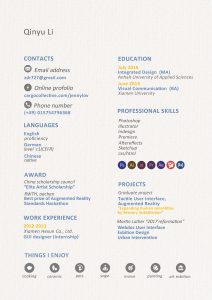Qinyu Li M.A.
Vita
 Qinyu Li studied Visual Communication at Xiamen University (China) in 2009-2013. And her Master –Intergrade Design at Anhalt University of Applied Sciences (Germany) which funded by China Scholarship Council in 2015-2016. She is a Ph.D. candidate in group of Information Systems and New Media at Siegen university since November 2016.
Qinyu Li studied Visual Communication at Xiamen University (China) in 2009-2013. And her Master –Intergrade Design at Anhalt University of Applied Sciences (Germany) which funded by China Scholarship Council in 2015-2016. She is a Ph.D. candidate in group of Information Systems and New Media at Siegen university since November 2016.More information available: http://cargocollective.com/jennylov
Publikationen
2021
-
Li, Q. (2021)Learning from the Past – The Use of Secondary Qualitative Material in a Design Education Context
, Siegen, Germany
[BibTeX] [Abstract] [Download PDF]In this thesis, I examine the use of qualitative data drawn from existing project material as a resource for design education. The use of second-hand qualitative data has been discussed extensively in relation to the ‘open science’ agenda, but its use as an educational resource has not. To investigate the extent to which second-hand qualitative data might be useful for analytic work, I conducted a study in which students were encouraged to use Grounded Design – a usercentred design approach in Siegen Social Informatic group- as a means to leverage data of this kind. Four design seminars were carried out to allow Master’s students participating in an HCI program access to substantial datasets collected in two long-term research projects that had finished some time previously. In the first seminar, the students were asked to select content from this dataset, analyse it, and then, on the basis of this, form conclusions about possible design opportunities. The study reveals a number of challenges and insights regarding what it takes to use qualitative data as a resource for design. After that, I involved students in the second and third seminar in the design process of preparing the secondary research data, namely designing tools and curating data. An artefact called DesignCaser was developed, and later, tested by the fourth seminar students. The evaluation of the processes undergone revealed both that students saw the exercise as useful and illuminating with respect to their understanding of how qualitative material can be used for design purposes but also, at the same time demonstrated some of the challenges involved. These were primarily to do with the amount of material, how it was curated, the nature of the data, and the time available to them.
@phdthesis{li_learning_2021, address = {Siegen, Germany}, title = {Learning from the {Past} – {The} {Use} of {Secondary} {Qualitative} {Material} in a {Design} {Education} {Context}}, url = {https://www.wineme.uni-siegen.de/wp-content/uploads/2021/10/Dissertation_Qinyu_Li.pdf}, abstract = {In this thesis, I examine the use of qualitative data drawn from existing project material as a resource for design education. The use of second-hand qualitative data has been discussed extensively in relation to the ‘open science’ agenda, but its use as an educational resource has not. To investigate the extent to which second-hand qualitative data might be useful for analytic work, I conducted a study in which students were encouraged to use Grounded Design – a usercentred design approach in Siegen Social Informatic group- as a means to leverage data of this kind. Four design seminars were carried out to allow Master’s students participating in an HCI program access to substantial datasets collected in two long-term research projects that had finished some time previously. In the first seminar, the students were asked to select content from this dataset, analyse it, and then, on the basis of this, form conclusions about possible design opportunities. The study reveals a number of challenges and insights regarding what it takes to use qualitative data as a resource for design. After that, I involved students in the second and third seminar in the design process of preparing the secondary research data, namely designing tools and curating data. An artefact called DesignCaser was developed, and later, tested by the fourth seminar students. The evaluation of the processes undergone revealed both that students saw the exercise as useful and illuminating with respect to their understanding of how qualitative material can be used for design purposes but also, at the same time demonstrated some of the challenges involved. These were primarily to do with the amount of material, how it was curated, the nature of the data, and the time available to them.}, language = {en}, school = {University of Siegen}, author = {Li, Qinyu}, month = sep, year = {2021}, keywords = {Dissertation}, }
2020
-
Li, Q., Tolmie, P., Weibert, A., Schorch, M., Müller, C. & Wulf, V. (2020)E-Portfolio: value tensions encountered in documenting design case studies
IN Ethics and Information Technology, Pages: 5
[BibTeX] [Abstract]We present here the “e-Portfolio” concept, which aims to provide access to documented design case studies of design researchers’ practices. Our e-Portfolio has its origins in Grounded Design. We examine here how the e-Portfolio concept grew out of Grounded Design, the way it instantiates values, and how it contributes to our understanding of the ways in which shifting values in practice can have an impact beyond the individual.
@article{li_e-portfolio_2020, title = {E-{Portfolio}: value tensions encountered in documenting design case studies}, abstract = {We present here the “e-Portfolio” concept, which aims to provide access to documented design case studies of design researchers’ practices. Our e-Portfolio has its origins in Grounded Design. We examine here how the e-Portfolio concept grew out of Grounded Design, the way it instantiates values, and how it contributes to our understanding of the ways in which shifting values in practice can have an impact beyond the individual.}, language = {en}, journal = {Ethics and Information Technology}, author = {Li, Qinyu and Tolmie, Peter and Weibert, Anne and Schorch, Marén and Müller, Claudia and Wulf, Volker}, year = {2020}, keywords = {italg}, pages = {5}, }
2019
-
Mosconi, G., Li, Q., Randall, D., Karasti, H., Tolmie, P., Barutzky, J., Korn, M. & Pipek, V. (2019)Three Gaps in Opening Science
IN Computer Supported Cooperative Work (CSCW), Vol. 28, Pages: 749–789 doi:10.1007/s10606-019-09354-z
[BibTeX] [Abstract] [Download PDF]The Open Science (OS) agenda has potentially massive cultural, organizational and infrastructural consequences. Ambitions for OS-driven policies have proliferated, within which researchers are expected to publish their scientific data. Significant research has been devoted to studying the issues associated with managing Open Research Data. Digital curation, as it is typically known, seeks to assess data management issues to ensure its long-term value and encourage secondary use. Hitherto, relatively little interest has been shown in examining the immense gap that exists between the OS grand vision and researchers’ actual data practices. Our specific contribution is to examine research data practices before systematic attempts at curation are made. We suggest that interdisciplinary ethnographically-driven contexts offer a perspicuous opportunity to understand the Data Curation and Research Data Management issues that can problematize uptake. These relate to obvious discrepancies between Open Research Data policies and subject-specific research practices and needs. Not least, it opens up questions about how data is constituted in different disciplinary and interdisciplinary contexts. We present a detailed empirical account of interdisciplinary ethnographically-driven research contexts in order to clarify critical aspects of the OS agenda and how to realize its benefits, highlighting three gaps: between policy and practice, in knowledge, and in tool use and development.
@article{mosconi_three_2019, title = {Three {Gaps} in {Opening} {Science}}, volume = {28}, issn = {1573-7551}, url = {https://doi.org/10.1007/s10606-019-09354-z}, doi = {10.1007/s10606-019-09354-z}, abstract = {The Open Science (OS) agenda has potentially massive cultural, organizational and infrastructural consequences. Ambitions for OS-driven policies have proliferated, within which researchers are expected to publish their scientific data. Significant research has been devoted to studying the issues associated with managing Open Research Data. Digital curation, as it is typically known, seeks to assess data management issues to ensure its long-term value and encourage secondary use. Hitherto, relatively little interest has been shown in examining the immense gap that exists between the OS grand vision and researchers’ actual data practices. Our specific contribution is to examine research data practices before systematic attempts at curation are made. We suggest that interdisciplinary ethnographically-driven contexts offer a perspicuous opportunity to understand the Data Curation and Research Data Management issues that can problematize uptake. These relate to obvious discrepancies between Open Research Data policies and subject-specific research practices and needs. Not least, it opens up questions about how data is constituted in different disciplinary and interdisciplinary contexts. We present a detailed empirical account of interdisciplinary ethnographically-driven research contexts in order to clarify critical aspects of the OS agenda and how to realize its benefits, highlighting three gaps: between policy and practice, in knowledge, and in tool use and development.}, language = {en}, number = {3}, urldate = {2021-04-16}, journal = {Computer Supported Cooperative Work (CSCW)}, author = {Mosconi, Gaia and Li, Qinyu and Randall, Dave and Karasti, Helena and Tolmie, Peter and Barutzky, Jana and Korn, Matthias and Pipek, Volkmar}, month = jun, year = {2019}, pages = {749--789}, }
2018
-
Unbehaun, D., Vaziri, D., Aal, K., Li, Q., Wieching, R. & Wulf, V. (2018)Video-game Based Exergames for People with Dementia and Their Caregivers
Proceedings of the 2018 ACM Conference on Supporting Groupwork. New York, NY, USA, Publisher: ACM, Pages: 401–405 doi:10.1145/3148330.3154506
[BibTeX] [Download PDF]@inproceedings{unbehaun_video-game_2018, address = {New York, NY, USA}, series = {{GROUP} '18}, title = {Video-game {Based} {Exergames} for {People} with {Dementia} and {Their} {Caregivers}}, isbn = {978-1-4503-5562-9}, url = {http://doi.acm.org/10.1145/3148330.3154506}, doi = {10.1145/3148330.3154506}, booktitle = {Proceedings of the 2018 {ACM} {Conference} on {Supporting} {Groupwork}}, publisher = {ACM}, author = {Unbehaun, David and Vaziri, Daryoush and Aal, Konstantin and Li, Qinyu and Wieching, Rainer and Wulf, Volker}, year = {2018}, keywords = {participatory design, dementia, exergame, ict}, pages = {401--405}, } -
Unbehaun, D., Vaziri, D., Aal, K., Li, Q., Wieching, R. & Wulf, V. (2018)MobiAssist – ICT-based Training System for People with Dementia and Their Caregivers: Results from a Field Study
Proceedings of the 2018 ACM Conference on Supporting Groupwork. New York, NY, USA, Publisher: ACM, Pages: 122–126 doi:10.1145/3148330.3154513
[BibTeX] [Download PDF]@inproceedings{unbehaun_mobiassist_2018, address = {New York, NY, USA}, series = {{GROUP} '18}, title = {{MobiAssist} - {ICT}-based {Training} {System} for {People} with {Dementia} and {Their} {Caregivers}: {Results} from a {Field} {Study}}, isbn = {978-1-4503-5562-9}, url = {http://doi.acm.org/10.1145/3148330.3154513}, doi = {10.1145/3148330.3154513}, booktitle = {Proceedings of the 2018 {ACM} {Conference} on {Supporting} {Groupwork}}, publisher = {ACM}, author = {Unbehaun, David and Vaziri, Daryoush and Aal, Konstantin and Li, Qinyu and Wieching, Rainer and Wulf, Volker}, year = {2018}, keywords = {participatory design, dementia, exergame, ict, mobiassist}, pages = {122--126}, }


